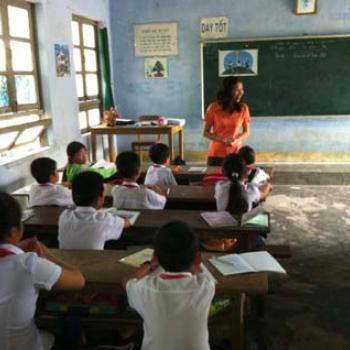
Next Monday, 12 August, sees the international launch of the new findings of our survey of schools in Vietnam, where 87% of 10-year-olds told us they read books outside school. We'll be comparing our most surprising findings with data from elsewhere, throwing some interesting new light on what kind of systems deliver the best and worst learning outcomes for children from disadvantaged backgrounds.
The study is the first of its kind in Vietnam, and our analysis builds on the ongoing longitudinal survey since 2002 of all the Young Lives children and their households, with the school survey having been carried out during the school year 2011-12.
Data was collected from 3,284 Grade 5 pupils, in 176 classes in 56 schools or 92 school sites (with satellite sites considered separately from the main school). All of the children completed an interview questionnaire and were tested in Mathematics and Vietnamese at both the start and end of the school year. Each test had 30 multiple-choice questions, designed to test knowledge of the curriculum. Questions were of varying levels of difficulty, making it easier to separate out low- and high-performing students. Both tests contained a number of common (anchor) items.
The design makes it possible to answer key questions about children's learning and their learning progress as well as the effectiveness of schools and teaching in delivering progress in relation to the curriculum (often referred to as the value-added of schooling).
The unique combination of longitudinal data about the children and their backgrounds and the focus on effective schooling adds some interesting new findings to the evidence available in existing cross-sectional studies conducted by MOET and the World Bank, and is the first of its kind in Vietnam.
The study was conducted in 20 study sites, situated across five selected provinces (Ben Tre, Danang, Hung Yen, Lao Cai, and Phu Yen) by Caine Rolleston, Zoe James, Laure Pasquier-Dourner, Tran Ngo Thi Minh Tam and Le Thuc Duc. Sign up here if you would like to receive regular research updates from Young Lives.

Next Monday, 12 August, sees the international launch of the new findings of our survey of schools in Vietnam, where 87% of 10-year-olds told us they read books outside school. We'll be comparing our most surprising findings with data from elsewhere, throwing some interesting new light on what kind of systems deliver the best and worst learning outcomes for children from disadvantaged backgrounds.
The study is the first of its kind in Vietnam, and our analysis builds on the ongoing longitudinal survey since 2002 of all the Young Lives children and their households, with the school survey having been carried out during the school year 2011-12.
Data was collected from 3,284 Grade 5 pupils, in 176 classes in 56 schools or 92 school sites (with satellite sites considered separately from the main school). All of the children completed an interview questionnaire and were tested in Mathematics and Vietnamese at both the start and end of the school year. Each test had 30 multiple-choice questions, designed to test knowledge of the curriculum. Questions were of varying levels of difficulty, making it easier to separate out low- and high-performing students. Both tests contained a number of common (anchor) items.
The design makes it possible to answer key questions about children's learning and their learning progress as well as the effectiveness of schools and teaching in delivering progress in relation to the curriculum (often referred to as the value-added of schooling).
The unique combination of longitudinal data about the children and their backgrounds and the focus on effective schooling adds some interesting new findings to the evidence available in existing cross-sectional studies conducted by MOET and the World Bank, and is the first of its kind in Vietnam.
The study was conducted in 20 study sites, situated across five selected provinces (Ben Tre, Danang, Hung Yen, Lao Cai, and Phu Yen) by Caine Rolleston, Zoe James, Laure Pasquier-Dourner, Tran Ngo Thi Minh Tam and Le Thuc Duc. Sign up here if you would like to receive regular research updates from Young Lives.

